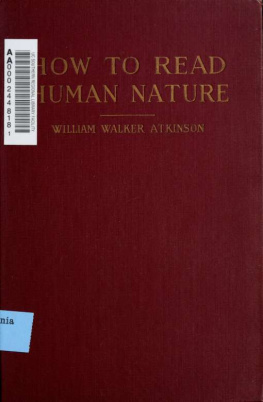This book made available by the Internet Archive.
URL
&c
| y7l*3.
HOW TO READ HUMAN NATURE
CHAPTER I
INNER STATE AND OUTER FORM
"Human Nature" is a term most frequently used and yet but little understood. The average person knows in a general way what he and others mean when this term is employed, but very few are able to give an off-hand definition of the term or to state what in their opinion constitutes the real essence of the thought expressed by the familiar phrase. We are of the opinion that the first step in the process of correct understanding of any subject is that of acquaintance with its principal terms, and, so, we shall begin our consideration of the subject of Human Nature by an examination of the term used to express the idea itself.
"Human," of course, means "of or pertaining to man or mankind." Therefore, Human Nature means the nature of man or mankind. "Nature," in this usage, means: '' The natural disposition of mind of any person; temper; personal character; individual
constitution; the peculiar mental characteristics and attributes which serve to distinguish one person from another."
Thus we see that the essence of the nature of men, or of a particular human being, is the mind, the mental qualities, characteristics, properties and attributes. Human Nature is then a phase of psychology and subject to the laws, principles and methods of study, examination and consideration of that particular branch of science.
But while the general subject of psychology includes the consideration of the inner workings of the mind, the processes of thought, the nature of feeling, and the oj)eration of the will, the special subject of Human Nature is concerned only with the question of character, disposition, temperament, personal attributes, etc., of the individuals making up the race of man. Psychology is generalHuman Nature is particular. Psychology is more or less abstractHuman Nature is concrete. Psychology deals with laws, causes and principlesHuman Nature deals with effects, manifestations, and expressions.
Human Nature expresses itself in two gen
eral phases, i.e., (1) the phase of Inner States; and (2) the phase of Outer Forms. These two phases, however, are not separate or opposed to each other, but are complementary aspects of the same thing. There is always an action and reaction between the Inner State and the Outer Formbetween the Inner Feeling and the Outer Expression. If we know the particular Inner State we may infer the appropriate Outer Form; and if we know the Outer Form we may infer the Inner State.
That the Inner State affects the Outer Form is a fact generally acknowledged by men, for it is in strict accordance with the general experience of the race. We know that certain mental states will result in imparting to the countenance certain lines and expressions appropriate thereto; certain peculiarities of carriage and manner, voice and demeanor. The facial characteristics, manner, walk, voice and gestures of the miser will be recognized as entirely different from that of the generous person; those of the coward differ materially from those of the brave man; those of the vain are distinguished from
those of the modest. We know that certain mental attitudes will produce the corresponding physical expressions of a smile, a frown, an open hand, a clenched fist, an erect spine or bowed shoulders, respectively. We also know that certain feelings will cause the eye to sparkle or grow dim, the voice to become resonant and positive or to become husky and weak; according to the nature of the feelings.
Prof. Wm. James says: "What kind of emotion of fear would be left if the feeling neither of trembling lips nor of weakened limbs, neither of goose-flesh nor of visceral stirrings, were present, it is quite impossible for me to think. Can one fancy the state of rage and picture no ebullition in the chest, no flushing of the face, no dilation of the nostrils, no clenching of the teeth, no impulse to vigorous action, but in their stead limp muscles, calm breathing, and a placid face ?''
Prof. Halleck ays: "All the emotions have well-defined muscular expression. Darwin has written an excellent work entitled, The Expression of the Emotions in Man and Animals, to which students must refer for a detailed account of such expression. A very
few examples must suffice here. In all the exhilarating emotions, the eyebrows, the eyelids, the nostrils, and the angles of the mouth are raised. In the depressing passions it is the reverse. This general statement conveys so much truth, that a careful observer can read a large part of the history of a human being written in the face. For this reason many phrenologists have wisely turned physiognomists. Grief is expressed by raising the inner ends of the eyebrows, drawing down the corners of the mouth, and transversely wrinkling the middle part of the forehead. In Terra del Fuego, a party of natives conveyed to Darwin the idea that a certain man was low-spirited, by pulling down their cheeks in order to make their faces long. Joy is expressed by drawing backward and upward the corners of the mouth. The upper lip rises and draws the cheeks upward, forming wrinkles under the eyes. The elevation of the upper lip and the nostrils expresses contempt. A skillful observer can frequently tell if one person admires another. In this case the eyebrows are raised, disclosing a brightening eye and a relaxed expression; sometimes a gentle smile plays about
the mouth. Blushing is merely the physical expression of certain emotions. We notice the expression of emotion more in the countenance, because the effects are there more plainly visible; but the muscles of the entire body, the vital organs, and the viscera, are also vehicles of expression."
These things need but a mention in order to be recognized and admitted. This is the action of the Inner upon the Outer. There is, however, a reaction of the Outer upon the Inner, which while equally true is not so generally recognized nor admitted, and we think it well to briefly call your attention to the same, for the reason that this correspondence between the Inner and the Outerthis reaction as well as the action must be appreciated in order that the entire meaning and content of the subject of Human Nature may be fully grasped.
That the reaction of the Outer Form upon the Inner State may be understood, we ask you to consider the following opinions of well-known and accepted authorities of the New Psychology, regarding the established fact that a physical expression related to a
mental state, will, if voluntarily induced, tend to in turn induce the mental state appropriate to it. We have used these quotations in other books of this series, but will insert them here in this place because they have a direct bearing upon the particular subject before us, and because they furnish direct and unquestioned authority for the statements just made by us. We ask you to consider them carefully, for they express a most important truth.









